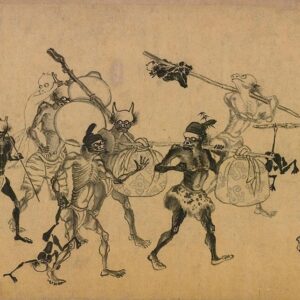
Announcing the Winners of the 2022 O. Henry Prize for Short Fiction
Read Winning Stories by Olga Tokarczuk, Daniel Mason, and Alejandro Zambra
Terms of eligibility can be as revealing through those they exclude as through those they welcome. The first O. Henry Prize collection, published in 1919, ruled out all non-American writers. Yet in that very first edition, series editor Blanche Colton Williams called attention to several accomplished stories that she regretted were ineligible for consideration. Jacke Wilson, host of the History of Literature podcast, recently unearthed Williams’s introduction to that 1919 O. Henry collection and found in it this admission: “According to the terms which omit foreign authors from possible participation in the prize, the work of Achmed Abdullah, Britten Austin, Elinor Mordaunt and others was in effect non-existent for the Committee.” Williams goes on to describe at length the three missing stories by these authors, highlighting their unfortunate absence from the book and from the prize.
Over the next decades at least one expansion was made to the eligibility rules for the O. Henry Prize. It is not clear exactly when this happened, but in 1955 a student in Florida mentioned in her master’s thesis on the O. Henry series that “foreign-born authors were eligible if they became U.S. citizens.”
In the 1990s the prize was further opened to Canadian writers. We can guess that the motivation for that may have been to allow consideration of stories by the widely acclaimed Canadian short-story writer (and future Nobel laureate) Alice Munro. A further expansion came in 2003 under the ninth series editor, Laura Furman. The Publishers Weekly review of the 2003 edition noted, “A new, wider-ranging selection process (allowing the consideration of all English-language writers appearing in North American publications regardless of citizenship) makes this one of the strongest O. Henry collections in recent years, with stories by, among others, Chimamanda Ngozi Adichie.”
Nineteen years later, the guest editor for the 2022 volume, Valeria Luiselli, has selected a brand-new story by Chimamanda Ngozi Adichie, along with ten remarkable stories in translation. This means that fully half of the winning stories this year are artistic collaborations with talented translators who enable readers of English to enjoy fiction originally crafted in Bengali, Greek, Hebrew, Norwegian, Polish, Russian, and Spanish. The subjects of this year’s twenty winning stories are predictably varied, but many touch on the pandemic, love and loss, though there is also humor and their appeal is universally human.
Readers of English have relied on translated stories at least since the Bible, and yet translations have long taken a backseat in our culture. If stories give us a window through which to momentarily enter the soul of another person, then translated stories magically transcend the limits of the language that has shaped our consciousness.
What I learned from Valeria Luiselli this year is nothing short of how to read in a new way. I learned to dissolve my previous conception of “successful” (perhaps tidy) literary translation and open the borders of my thinking to the living, dynamic melding of languages undertaken by the translators here in a way that opens one’s capacity to engage with literature and language generally. For every story is a work of translation, if only from thought to page and then into the reader’s particular consciousness.
–Jenny Minton Quigley, series editor for The Best Short Stories of The Year: The O. Henry Prize Winners
*
Alejandro Zambra, translated from the Spanish by Megan McDowell
“Screen Time,” The New York Times Magazine
Daniel Mason
“The Wolves of Circassia,” Zoetrope
Tere Dávila, translated from the Spanish by Rebecca Hanssens-Reed
“Mercedes’s Special Talent,” The Offing
Joseph O’Neill
“Rainbows,” The New Yorker
Shanteka Sigers
“A Way with Bea,” The Paris Review
Olga Tokarczuk, translated from the Polish by Jennifer Croft
“Seams,” Freeman’s
Yohanca Delgado
“The Little Widow from the Capital,” The Paris Review
Eshkol Nevo, translated from the Hebrew by Sondra Silverston
“Lemonade,” Guernica
’Pemi Aguda
“Breastmilk,” One Story
Amar Mitra, translated from the Bengali by Anish Gupta
“The Old Man of Kusumpur,” The Common
Christos Ikonomou, translated from the Greek by Karen Emmerich
“Where They Always Meet,” The Yale Review
Janika Oza
“Fish Stories,” The Kenyon Review
Vladimir Sorokin, translated from the Russian by Max Lawton
“Horse Soup,” n+1
Francisco González
“Clean Teen,” Gulf Coast
Michel Nieva, translated from the Spanish by Natasha Wimmer
“Dengue Boy,” Granta
Chimamanda Ngozi Adichie
“Zikora,” Amazon Original Stories
Gunnhild Øyehaug, translated from the Norwegian by Kari Dickson
“Apples,” Freeman’s
David Ryan
“Warp and Weft,” Harvard Review
Lorrie Moore
“Face Time,” The New Yorker
Samanta Schweblin, translated from the Spanish by Megan McDowell
“An Unlucky Man,” McSweeney’s Quarterly Concern
__________________________________
The Best Short Stories 2022: The O. Henry Prize Winners, edited by Valeria Luiselli; series edited by Jenny Minton Quigley, will be published in September by Anchor Books.



















